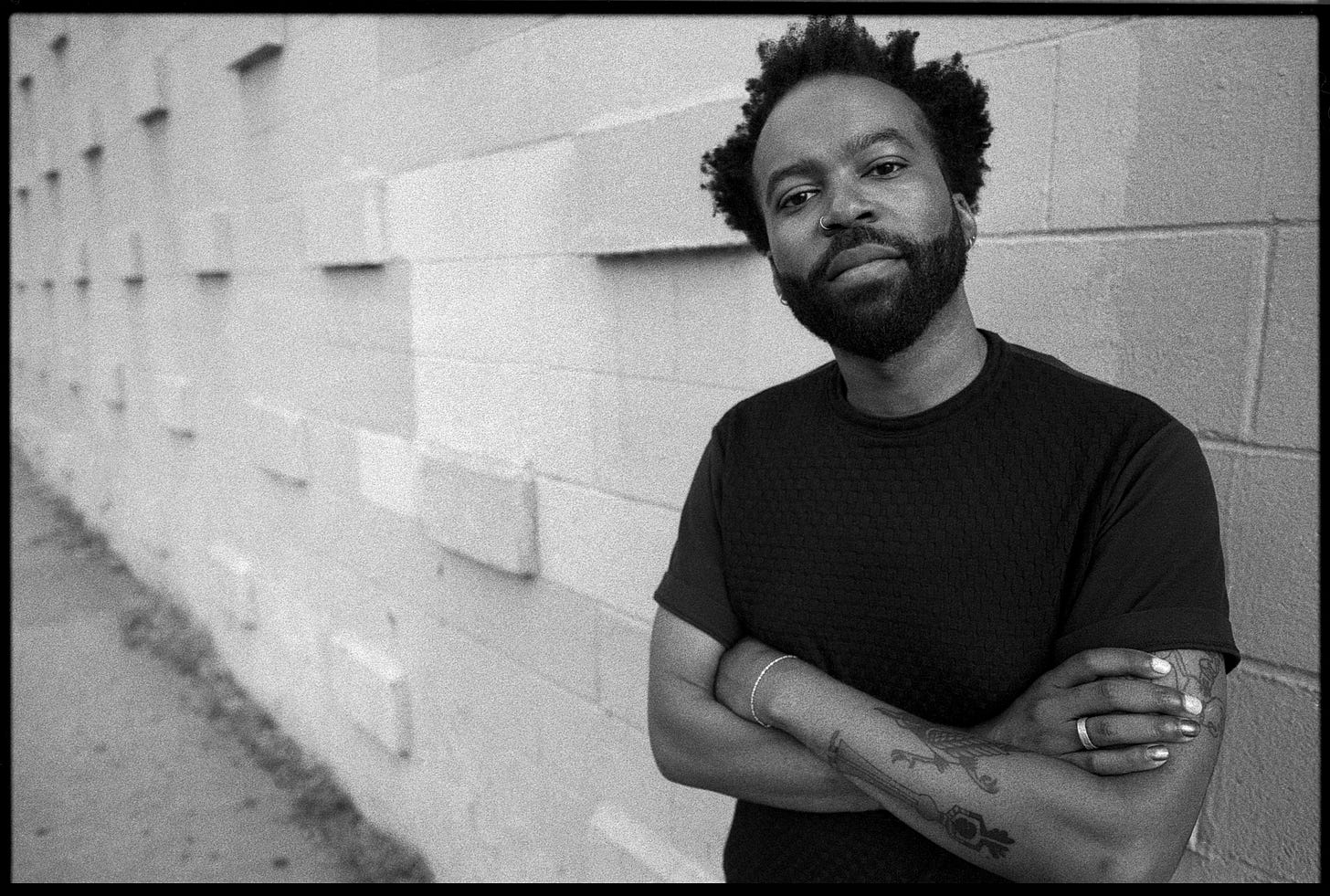Take Five: Josh Johnson, Dayna Stephens, Jamie Baum, Steph Richards, John Escreet
All killer, no filler: the first in a series of music recs.
Music recommendations aren’t hard to come by on the internet, which is one reason I’ve largely shied away from that function here at The Gig. The other reason, if I’m being honest, is that I needed to recover from a little burnout. For several years, I ran a weekly column at WBGO called Take Five: a curated batch of five new and notable tracks, with critical annotation. Before that, I was a contributor to The Playlist at the NYT, and a prior iteration of Playlist (RIP) that ran in Arts & Leisure.
I’ve come back around to the conviction that this format could be a valuable service, especially at a moment when so much incredible music is slipping under the cultural radar. So, as I promised a few weeks ago, I’m reclaiming Take Five for The Gig.
This is the first installment of a regular feature, which will go out twice a month. Each edition will cover a healthy range of jazz and improvised music, and I won’t ever recommend anything I’m lukewarm about. I hope it leads you to some musical discoveries — and I hope you’ll let me know about them.
Before we dive in, a word about Albert “Tootie” Heath, who died this week at 88. Heath was an absolutely brilliant drummer whose sound permeates the modern jazz landscape, though he never got the shine afforded some of his contemporaries. I received word of his passing in the grocery aisle, via a text from
. After I got home and fixed dinner, I set to work, managing to publish this obituary at WRTI just before the stroke of midnight. Tootie was Philadelphia royalty, among other things, and I’m glad I had this chance to pay tribute. If you haven’t seen it yet, you’ll also want to read Ethan’s personal reflection at Transitional Technology.In the spirit of sharing, here is my NYT review of Tootie’s Tempo, the first studio album by the Tootie Heath Trio with Ethan Iverson and Ben Street. It ran in the now-defunct (RIP) album review column, opposite Big Sean’s Hall of Fame. I’ve “gifted” the link for anybody who needs help past the paywall.
On to the main event…
Take Five: April 5, 2024
Josh Johnson, “Marvis”
The solo saxophone improv recital has a distinguished history in the avant-garde, with its bravest exponents coming out of the ranks of the AACM. Josh Johnson hails from that organization’s cradle of Chicago, but he’s been an L.A. guy since 2002, when he was selected for the Thelonious Monk Institute of Jazz Performance. He’s a dream collaborator whose clear, cool alto sax timbre you have probably noticed on heralded recent albums by Makaya McCraven, Jeff Parker and Meshell Ndegeocello.
Unusual Object, out today on Northern Spy, is Johnson’s stylish and deeply considered take on the solo recital, though a casual listen might lead to you think otherwise. Because he’s so adept at pedal loops, live sampling and electronic manipulation — elements he deploys to great effect with Meshell and others — Johnson knows how to construct fully realized tracks in real time. “Marvis” is a perfect illustration of this deft skill set, along with Johnson’s ear for motivic development. I’ve seen beguiling footage of him performing the track live, which I presume will be publicly available soon. In the meantime, the music tells you all that you need to know.
Dayna Stephens, “The Nomad”
A couple of months ago I caught Lux Quartet at Solar Myth. The band is co-led by drummer Allison Miller and pianist Myra Melford, and their push-pull interplay lies at the heart of the music, with bassist Scott Colley as a fulcrum. Where then did that leave its tenor saxophonist, Dayna Stephens? Basically, wherever he chose to flow — through the seams, over the top, around the bend, magnetic at every turn.
Stephens has done this sort of thing so reliably, with elders like Kenny Barron as well as peers like Gerald Clayton, that it’s a little too easy to take him for granted. His own output on record should be a bulwark against that fate, especially when it’s as sharp as Closer Than We Think, on Cellar Music Group. This album stands squarely in the postmillennial mod-jazz mainstream — you could book it on a companionable double bill with another fine album out today, Melissa Aldana’s Echoes of the Inner Prophet, which I wrote about here — but its brand of unassuming insight feels specific to Stephens. Working with some wonderfully cosmopolitan partners (Emmanuel Michael on guitar, Kanoa Mendenhall on bass, Jongkuk Kim on drums), he glides through nearly a dozen tunes, across a cool range of tonal expression.
“The Nomad,” incidentally featured on NPR Music Live Sessions via WRTI in 2021, is a Stephens original with a seductive ostinato and a searching melodic line. Apparently the title invokes a term applied to Gen X in The Fourth Turning, a social sciences book by William Strauss and Neil Howe. (Stephens is 45, which puts him, like me, near the tail end of the Gen X cutoff.) The hint of wary diffidence is a feature, not a bug.
Jamie Baum, “In Those Years” (feat. Theo Bleckmann)
What Times Are These, a gorgeous new album by flutist and composer Jamie Baum, falls into a category you might have grown to resent: call it the pandemic epiphany. In her liner notes, Baum explains how the disquiet and stillness of lockdown drove her headlong into composing — and toward poetry, which had never been a source of solace for her before. Whatever it took to get her there, we should feel fortunate, because these compositions, for the mid-size chamber ensemble known as her Septet+, feel illuminated from within.
A handful of exceptional vocalists bring the text to life, and on “In Those Years,” which sets a breathtaking poem by Adrienne Rich to a tumbling vamp in quintuple meter, the duty falls to Theo Bleckmann, who brings his usual adroitness and emotional transparency. (Don’t miss what he does with a repetition of first- and second-person pronouns, cutting to the heart of the poem.) The instrumental solos, both winning, are by alto saxophonist Sam Sadigursky and pianist Luis Perdomo.
Steph Richards, “Power Vibe”
Steph Richards is a slippery sort of trumpet virtuoso — the sort of player who, like her contemporaries Nate Wooley and Peter Evans, often nudges the instrument toward the outer limits of its technical vocabulary without getting hung up on idiom. (Perhaps you recall her 2020 album SUPERSENSE, which paired each track with an olfactory complement — the CD, literally scratch ‘n’ sniff, is presently sold out.)
Power Vibe, her latest release, due out on May 3, comes with a more personal concept: it’s the first album Richards has made since running into physical setbacks that required her to completely reconstruct her embouchure. “I had exhausted my setup,” she explains in a press note, “and I had to hit the shed and fully remake my face.” You don’t need this backstory to appreciate the spirit of discovery on the album, with pianist Joshua White, bassist Stomu Takeishi, and drummers Gerald Cleaver and Max Jaffe. They worked with a system of visual cues to redirect energy in the group — like an open-source take on Butch Morris conduction©️, if I’m understanding correctly. The title track bears a dedication to Wayne Shorter, just the right intrepid totem (though its play of intervals up front reminds me of his running buddy, Joe Zawinul).
John Escreet, “Departure No. 1”
The English-born pianist and composer John Escreet has a knack for creating whorls of action and implication in his music; he has that in common with a former teacher, Jason Moran, and one of their shared lodestars, Andrew Hill. There’s actually an Andrew Hill composition, “Erato,” on the forthcoming album by Escreet, which he’s titled the epicenter of your dreams. I haven’t heard that track yet, but if the two lead singles are any indication, the album will get heavy rotation on my system this year.
Escreet’s previous release, Seismic Shift, introduced a hyper-dynamic trio with bassist Eric Revis and drummer Damion Reid. How do you improve on that lineup? Obviously, you add Mark Turner on tenor saxophone. Just listen to what Turner does with a version of “Departure No. 1,” from the 1974 Stanley Cowell album Musa - Ancestral Streams. Escreet, who put a track from that same album on Seismic Shift, apparently transcribed this one from the LP, and it has the spark of fresh intel.
And that’s a wrap for this first edition of Take Five on The Gig. Please remember to support these artists — ideally with an album purchase, if you can.








I just listened to Dayna Stephens' album, and second your recommendation. Worth repeat listens.
All those tunes are absolutely beautiful! I'm glad you're doing this personal sharing. I think it's an essential role for a critic to do so in this time. I still collect physical music and will be buying hard copies.